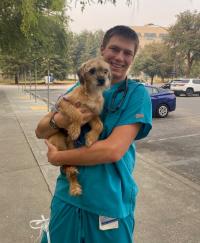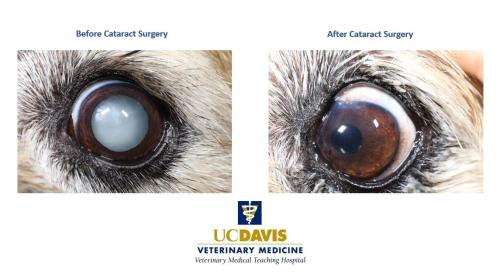
Diabetic Dog Has Sight Restored
“Case of The Month” – August 2021
When Teddy, a 12-year-old border terrier, was diagnosed with diabetes, his care team at the UC Davis veterinary hospital predicted he would eventually go blind. Within five months of the diagnosis, that prediction came true. Cataracts caused by the diabetes had formed in both of Teddy’s eyes completely clouding his vision. But UC Davis veterinary ophthalmologists offered hope, having performed many vision-restoring cataract surgeries over the years.

“It’s devastating when they tell you your dog is going to go blind,” said Teddy’s owner, Hattie Souza. “When we first got the diabetes diagnosis, Dr. (Craig) Sutter said, ‘This is going to be life changing.’ Oh boy, he wasn’t kidding. I got a lot thrown at me at once, but he was very good about how he told me that news.”
On top of the diabetes diagnosis—which immediately required twice daily insulin injections for the rest of Teddy’s life—and the vision concerns, Teddy also developed chronic kidney disease (CKD), which is thankfully only in Stage 1 and seems to be holding there.
“The kidney disease is at the very beginning,” said Souza. “Dr. Sutter informed me that this usually comes along with the diabetes. Thankfully, it has not progressed from Stage 1, and Teddy is not on any medication or special diet for that.”
Based on his overall eye health and blood work results, Teddy was cleared for surgery to remove the cataracts from both eyes. Ophthalmologists utilized a procedure called phacoemulsification, where a probe was placed into a small incision in both eyes. The probe used ultrasonic waves to break down and remove the clouded lenses. Artificial lenses were then placed in the eyes, restoring Teddy’s vision.

Teddy recovered with no complications, and post-operative examinations confirmed vision in both eyes. However, cataract surgery can lead to many potential complications such as uncontrolled inflammation, glaucoma, infection, retinal detachment, dislocation of the artificial lens, or permanent blindness. To make sure these secondary issues did not arise for Teddy, his ophthalmology team set up extensive post-operative medical management including frequent topical eye medications, oral antibiotics, and anti-inflammatories.
Souza also had to commit to an extensive at-home care routine once Teddy was discharged. This included several eye medications, some as often as six times per day. As Teddy’s eye health improved with each recheck examination, the medications decreased. Now, Teddy’s eyes are fully healed. He only receives two eye drops per day, but he will require this forever.
“I’m diligent about the eye drops,” Souza said. “The doctors prepared me for this because it’s pretty incredible what you have to do.”
So now Souza has her work cut out for her, providing two eye drops and two insulin injections every day for Teddy for the rest of his life. The injections required a bit of a learning curve for Souza.
“I had never given an injection before,” said Souza. “But Dr. Sutter was very patient showing me how to give Teddy his shots. He spent a long time with me until I got it right.”
“All the doctors have been very responsive to my concerns and communications,” Souza continued. “I feel very lucky having the UC Davis team on Teddy’s case. Everyone has been wonderful, especially Dr. Sutter.”
“A lot of people can’t afford what I’ve done for Teddy, and I understand that – it breaks my heart for them,” Souza said. “I feel very fortunate that we can do it, because Teddy and all our animals are part of our family.”
# # #
Teddy is one of more than 80,000 dogs that are diagnosed with diabetes in the U.S. every year. One of Teddy’s clinicians—internal medicine specialist Dr. Sean Hulsebosch—recently completed work on a clinical trial (in which Teddy participated) that may bring to market a once-a-week insulin therapy, reducing an owner’s injection responsibility from 14 shots per week to one. Following positive results at multiple trial sites nationwide, the drug’s manufacturer recently signed an agreement with a pharmaceutical company to commercialize the drug, expecting marketability in a few years. So, there may be hope soon for a brighter future for Teddy and other diabetic dogs.
The expansion of veterinary services at the UC Davis veterinary hospital over the next decade will transform the hospital into the future Veterinary Medical Center (VMC), a state-of-the-art, comprehensive animal care facility rivaled by no other in the world. The VMC will allow UC Davis clinicians and researchers to collaboratively care for more animals like Teddy and advance the medicine and procedures they need to live longer and healthier lives.
